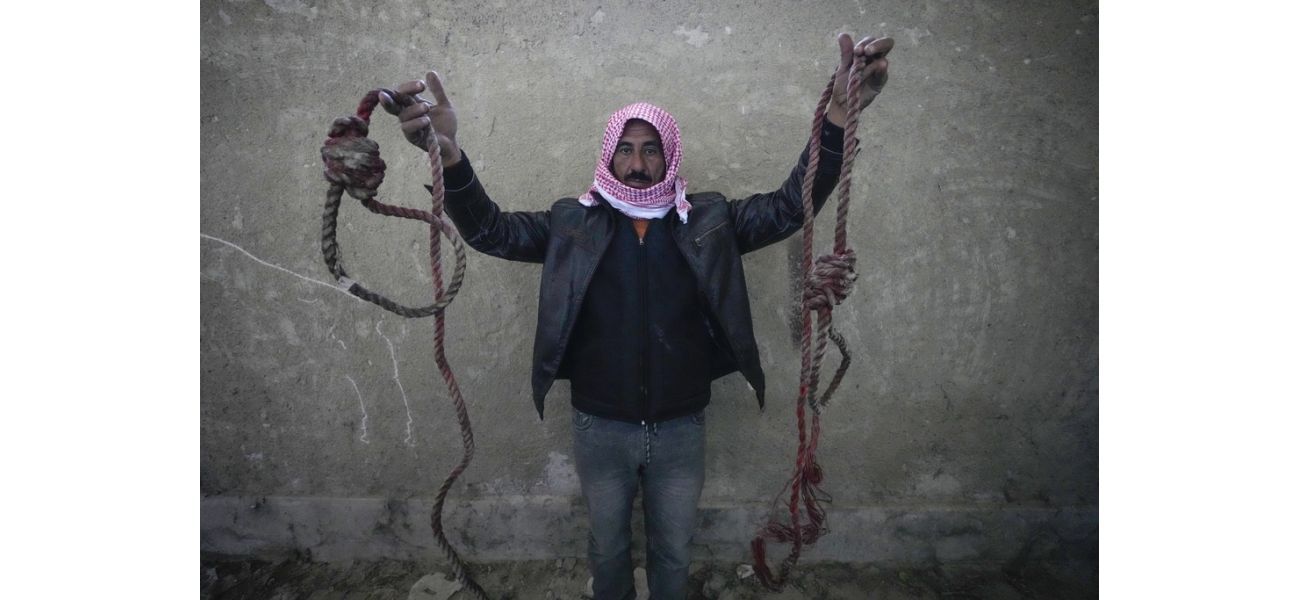A prisoner expected to die but was released instead.
Bashar Barhoum woke up in a Damascus dungeon, believing it was his final day on earth.
December 9th 2024.

It was a typical Sunday morning in Damascus, but for Bashar Barhoum, it was a day that he believed would be his last. The 63-year-old writer had spent the past seven months in a dark dungeon prison cell, waiting to be executed. As the dawn broke, he braced himself for the arrival of Bashar Assad's notorious security forces, who were known for their brutal treatment of prisoners.
But to his surprise, it wasn't the dreaded security forces at his cell door. It was rebels, who had come to set him free. As the insurgents continued their rapid advance across Syria, bringing an end to the Assad regime's 50-year rule, they also stormed prisons and security facilities, freeing political prisoners and others who had disappeared during the long conflict.
Barhoum was one of the lucky ones who emerged from the prison gates, blinking in the sunlight and feeling a sense of disbelief. "I haven't seen the sun until today," he exclaimed to the Associated Press, grateful for a new lease on life. He couldn't wait to find a way to contact his wife and daughters and let them know that he was alive and well.
Videos of the prisoners running in celebration quickly spread on social media, showing their joy and relief at being freed from the harsh conditions and systematic torture that was rampant in Syria's prisons. The infamous Saydnaya military prison, known as the "human slaughterhouse," was a particular site of horror, where secret executions took place on a weekly basis and thousands of Syrians lost their lives.
For many, the fall of the Assad regime was a long-awaited moment of justice and liberation. But for others, it was a time of uncertainty and anxiety. Lina Khatib, an Associate Fellow at the London think tank Chatham House, explained how fear had been used as a tool by the Assad regime to maintain control and crush any opposition.
But now, with the rebels in control, the tables had turned. As the insurgents broke open cell doors and freed prisoners, families of the disappeared anxiously waited outside prisons and security branches, hoping to be reunited with their loved ones. For them, the happiness of the regime's downfall would not be complete until their missing family members were found.
As the chaos and celebrations continued, Omar Alshogre, a former detainee who had survived relentless torture, watched from afar in awe. He couldn't believe that it had taken a few military groups to do what hundreds of democracies had failed to do - free the prisoners. Meanwhile, the families of detainees and the missing held onto hope, waiting for answers and for their loved ones to be returned to them.
In the midst of the joy and chaos, there were also heartbreaking scenes of families searching for their missing relatives. Heba, who had been waiting outside the Court of Justice, was desperately looking for her brother and brother-in-law, who had been detained in 2011 and never seen since. She spoke of the pain and uncertainty that had plagued her family for years, as they had no information about the fate of their loved ones.
But for many, there was a sense of hope and optimism for the future. With the rebels now in control and the Assad regime's reign of fear and oppression coming to an end, there was a glimmer of hope that justice would finally be served and the truth about what happened in Syria's prisons would come to light. As the country began to rebuild and heal, the memories of those who had suffered in the prisons would never be forgotten.
But to his surprise, it wasn't the dreaded security forces at his cell door. It was rebels, who had come to set him free. As the insurgents continued their rapid advance across Syria, bringing an end to the Assad regime's 50-year rule, they also stormed prisons and security facilities, freeing political prisoners and others who had disappeared during the long conflict.
Barhoum was one of the lucky ones who emerged from the prison gates, blinking in the sunlight and feeling a sense of disbelief. "I haven't seen the sun until today," he exclaimed to the Associated Press, grateful for a new lease on life. He couldn't wait to find a way to contact his wife and daughters and let them know that he was alive and well.
Videos of the prisoners running in celebration quickly spread on social media, showing their joy and relief at being freed from the harsh conditions and systematic torture that was rampant in Syria's prisons. The infamous Saydnaya military prison, known as the "human slaughterhouse," was a particular site of horror, where secret executions took place on a weekly basis and thousands of Syrians lost their lives.
For many, the fall of the Assad regime was a long-awaited moment of justice and liberation. But for others, it was a time of uncertainty and anxiety. Lina Khatib, an Associate Fellow at the London think tank Chatham House, explained how fear had been used as a tool by the Assad regime to maintain control and crush any opposition.
But now, with the rebels in control, the tables had turned. As the insurgents broke open cell doors and freed prisoners, families of the disappeared anxiously waited outside prisons and security branches, hoping to be reunited with their loved ones. For them, the happiness of the regime's downfall would not be complete until their missing family members were found.
As the chaos and celebrations continued, Omar Alshogre, a former detainee who had survived relentless torture, watched from afar in awe. He couldn't believe that it had taken a few military groups to do what hundreds of democracies had failed to do - free the prisoners. Meanwhile, the families of detainees and the missing held onto hope, waiting for answers and for their loved ones to be returned to them.
In the midst of the joy and chaos, there were also heartbreaking scenes of families searching for their missing relatives. Heba, who had been waiting outside the Court of Justice, was desperately looking for her brother and brother-in-law, who had been detained in 2011 and never seen since. She spoke of the pain and uncertainty that had plagued her family for years, as they had no information about the fate of their loved ones.
But for many, there was a sense of hope and optimism for the future. With the rebels now in control and the Assad regime's reign of fear and oppression coming to an end, there was a glimmer of hope that justice would finally be served and the truth about what happened in Syria's prisons would come to light. As the country began to rebuild and heal, the memories of those who had suffered in the prisons would never be forgotten.
[This article has been trending online recently and has been generated with AI. Your feed is customized.]
[Generative AI is experimental.]
0
0
Submit Comment





